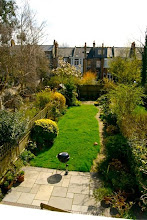





Where to begin? At the end, perhaps, as I've been in the final throes of fact-checking and proof-reading my book about Coco Chanel; and therefore now lurching in and out of the grip of jittery nerves and over-tiredness. One of my eyes is twitching -- not a good look -- and both are ringed with dark shadows. But still, the last stage of the journey has been as inspiring and intriguing as its earlier steps; and serendipity landed me in the right place at the right time, with a trip to the south of France. I was trailing Coco, of course, as always, but a sideways swing led to St Paul de Vence, that beautiful eyrie in the hills beyond Nice, and from there to the semi-imaginary landscape of Scott Fitzgerald's 'Tender Is The Night'. It still exists, although Scott and Zelda's rented villa on the beach at Juan les Pins has been remade into the Hotel Belles Rives. I sat on its terrace beneath a grey sky, a few days after the coast was battered by ferocious waves (the wind had whipped up stormy seas all along the Riviera, turning the Cote d'Azur into something darker); weather which somehow seemed true to the melancholy spirit of 'Tender Is The Night'. Notes to self: the title comes from Keats' Ode to a Nightingale, forming an epigram to Fitzgerald's novel:
Already with thee! tender is the night...
But here there is no light,
Save what from heaven is with the breezes blown
Through verdurous glooms and winding mossy ways.
And here is Fitzgerald's setting of the scene:
On the pleasant shore of the French Riviera, about half way between Marseilles and the Italian border, stands a large, proud, rose-colored hotel. Deferential palms cool its flushed façade, and before it stretches a short dazzling beach. Lately it has become a summer resort of notable and fashionable people; a decade ago it was almost deserted after its English clientele went north in April. Now, many bungalows cluster near it, but when this story begins only the cupolas of a dozen old villas rotted like water lilies among the massed pines between Gausse’s Hôtel des Étrangers and Cannes, five miles away.
I know that many readers of this blog are as entranced as I am by 'Tender Is The Night', and intrigued by its possible clues to the Fitzgeralds' marriage, as well as its fictional diversions and reinventions. Hence my pilgrimage to the Belles Rives, and thereafter to the Colombe d'Or in St Paul de Vence, where legend has it that Scott and Zelda dined one evening with their friends Gerald and Sara Murphy (to whom Tender Is The Night is dedicated). The story goes that when Gerald introduced Scott to Isadora Duncan on the terrace of the Colombe d'Or, the dancer ran her fingers through his hair, whereupon Zelda leapt down a dark stairwell, or off the terrace, or from a stone parapet into the darkness; a suicidal jump that left her bloodied and bruised, but still alive.
Not that my own journey was simply devoted to the memory of dead writers; nor was it entirely overshadowed by rainclouds. The sun came out at the
Hotel du Cap (surely the most glamorous place in southern France to drink tea on a Sunday afternoon, as well as the most terrifyingly expensive; how did the Fitzgeralds ever afford to come here, when he was an impecunious writer?) -- and shone on the hillside paths of St Paul de Vence, where stars are made out of stones, and the walls grow spring flowers...



































